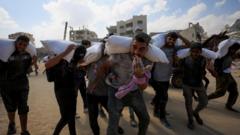Amid reports of increasing starvation amidst the ongoing conflict, more than 100 humanitarian organizations have voiced their concerns over the dire state in Gaza, while Israel denies these claims, asserting that aid groups are misrepresenting the situation.
Dire Conditions Escalate in Gaza Amid Claims of Mass Starvation

Dire Conditions Escalate in Gaza Amid Claims of Mass Starvation
Humanitarian groups report alarming malnutrition rates as over 100 organizations call for urgent action and Israel claims propaganda misuse.
In a grave warning, more than 100 international humanitarian and human rights organizations have issued a joint statement highlighting the unfolding crisis in Gaza, where mass starvation is rapidly becoming a reality. Led by Médecins Sans Frontières (MSF), Save the Children, and Oxfam, the groups claim that both their personnel and the populations they serve are "wasting away" amid severe shortages of food, medicine, and basic supplies.
The statement comes on the heels of the Gaza health ministry's report indicating the death of 10 Palestinians from malnutrition in the last 24 hours, pushing the total to 43 deaths in just three days. As conditions deteriorate, UN reports indicate hospitals are admitting individuals suffering from extreme exhaustion due to lack of food, while others collapse in public spaces from hunger-related ailments.
"With supplies now totally depleted, humanitarian organizations are witnessing their own colleagues and partners waste away before their eyes," the organizations expressed. They emphasized that aid workers are now sharing food lines in desperate attempts to nourish their families, facing risks of violence while doing so.
The Israeli government has dismissed the organizations' statements, accusing them of disseminating “Hamas propaganda.” This response coincides with an enforced blockade on aid deliveries that began in March, which further tightened following the military's offensive against Hamas and subsequent warfare. While partial easing of the blockade has occurred, warnings of famine have escalated, particularly among vulnerable groups such as children and the elderly, with diseases like acute watery diarrhea spreading rapidly.
Doctors in Gaza report unprecedented rates of acute malnutrition, prompting the World Health Organization to classify a quarter of the population as facing famine-like conditions. Desperate resident statements reveal unbearable strain, as a local lamented the soaring costs of basic food items—three hundred shekels ($90) for flour alone.
Furthermore, the ramifications of the military blockade have turned aid operations into perilous endeavors. Humanitarian workers report that millions of supplies remain inaccessible, often trapped in warehouses or outside Gaza, while the ongoing conflict presents deadly challenges for civilians seeking food relief.
With calls for an immediate ceasefire and unimpeded access for humanitarian aid, these organizations assert that governments must act decisively to alleviate suffering and restore adequate support structures. The Israeli government however, maintains its stance, insisting that measures put in place are essential for national security while claiming international organizations are failing to uphold untainted humanitarian narratives.
As the humanitarian crisis deepens, the outlook appears bleak amidst escalating tensions and conflicting narratives. The fate of Gaza's population hangs in the balance, as aid groups continue to implore the global community for urgent intervention to uphold basic human rights and services.

















